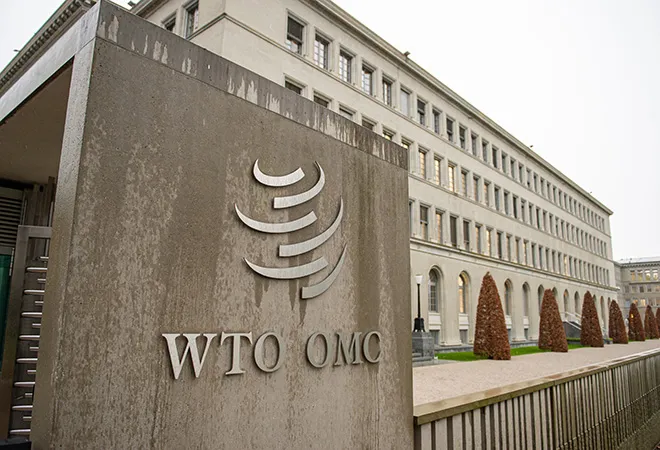
In the run-up to MC12, all the negotiations on fisheries subsidies highlight the global conundrum on the matter and difficulties faced by World Trade Organization (WTO) in consensus building. Putting it less euphemistically, the crux of the debate is—the cognizance of the overfished state of our oceans cannot undermine the vulnerability of the coastal communities of Least Developed Countries (LDCs) and developing countries for which fishing is the cornerstone of food security.
The advanced nations practising industrial fishing allowed their large industrial fleets to exploit the oceans for decades, while many developing countries and LDCs are still at subsistence level. Thus, it has been iterated multiple times by countries in various stages of negotiations and submissions that the ‘one-size-fits-all’ approach is not the answer.
Calling a spade, a spade
The
current draft of the ministerial decision states that no member shall grant or maintain subsidy to a vessel or operator engaged in Illegal Unreported and Unregulated (IUU) fishing.
Due to inadequate development of the fishing sector and lack of adequate infrastructure—most of the fishing catch landed is beach-based and not port-based.
The draft decision has a nice ring to it, however, a closer look highlights that the definition of IUU as has been set under the International Plan of Action of the UN Food and Agriculture Organisation (FAO) is quite disconcerting for the LDCs and developing countries. Due to inadequate development of the fishing sector and lack of adequate infrastructure—most of the fishing catch landed is beach-based and not port-based. This makes regulation and reporting burdensome. However, such fishing isn’t in contravention of international law. Both, the draft ministerial decision and the agreement of WTO propose a transition period of two years while
India proposes seven years transition period with respect to IUU fishing.
Additionally, with respect to overfished stock, the agreement states that no member shall grant subsidies if the stock is overfished as recognised by the coastal member or a relevant RFMO, based on the best scientific evidence available. Subsidies are allowed if the stock is rebuilt to reach a biologically sustainable level. This while seems a reasonable clause but is unbalanced. Firstly, due to the lack of adequate capacity building and technological know-how for rebuilding the stock, and secondly, due to the inability to monitor and measure the stock of fish amongst the vulnerable fishing community.
Furthermore, a closer look at the agreement underlines that the ‘elephant in the room’ still remains. The draft ministerial decision is mute on subsidies contributing to overfishing and overcapacity, which is the most incentivising subsidy for overfishing. This indiscreetly leads to injudicious exploitation of the ocean. Thus, despite the agreement, the larger apprehension around unsustainable fishing persists.
Periled perspective
The global conundrum around fisheries has put India in a precarious position. India while being a developing country, its fishing sector has not reached an industrialised level such as China—contributing merely about
7.7 percent to the global fish production and constituting only
4.1 percent of the total trade in fisheries.
Due to the lack of adequate capacity building and technological know-how for rebuilding the stock, and secondly, due to the inability to monitor and measure the stock of fish amongst the vulnerable fishing community.
In India, about
9 million people employed in the fishing sector— at the subsistence level practising traditional fishing, utilising smaller capital, small fishing vessels of about 20meterses in overall length and fishing closer to the shores— still depend on government support. India is part of only one RFMO indicating that it does not practice distant water fishing. Despite subsistence fishing and abject poverty, where fish is the only source of food on the plate for many, India has a disciplined fishing culture. Fishermen abstain from venturing into the sea for 61 days every year to rebuild the stock. Additionally, the Indian government gives only US$15 a year subsidy to its fishermen per family as against US$42,000, US 65,000, and US$75,000 given by other countries to a single fisherman family. The institutionalisation of this disparity with the current text will endanger future opportunities and any scope of growth that the traditional fishers might have.
The
10th of June draft agreement had a provision for harmful subsidies along with special and differential (S&DT) for LDCs and developing countries, but it has been left out of the document released on 17 June (as has been discussed in the previous section). The ministerial decision is silent on the most dangerous of all subsidies—subsidies contributing to overfishing and overcapacity due to difficulties in negotiating S&DT and the transition period which is generally granted to developing countries. It has been left for later.
The Indian government gives only US$15 a year subsidy to its fishermen per family as against US$42,000, US 65,000, and US$75,000 given by other countries to a single fisherman family.
In the light of the current text, India argues that the advanced fishing nations should own up to the rampant damage caused to the ocean ecosystem. India has
advocated for ‘common but differentiated responsibility’ and ‘the polluter pays principle’ for any agreement related to sustainability.
Despite support from Indonesia, Sri Lanka, and other developing countries on the matter, India has been tagged the deal blocker. For a more fortified future pitch on the issue, India must amass greater support from developing countries with shared interest in the matter to eradicate harmful subsidies with specific S&DT provisions as has been proposed by India in its
March 2020 submission. Building a collective consensus amongst the like-minded countries before the next Ministerial Conference can enable us to protect the fish stock and provide a more level playing field for the ones that need the most.
The views expressed above belong to the author(s). ORF research and analyses now available on Telegram! Click here to access our curated content — blogs, longforms and interviews.



 In the run-up to MC12, all the negotiations on fisheries subsidies highlight the global conundrum on the matter and difficulties faced by World Trade Organization (WTO) in consensus building. Putting it less euphemistically, the crux of the debate is—the cognizance of the overfished state of our oceans cannot undermine the vulnerability of the coastal communities of Least Developed Countries (LDCs) and developing countries for which fishing is the cornerstone of food security.
The advanced nations practising industrial fishing allowed their large industrial fleets to exploit the oceans for decades, while many developing countries and LDCs are still at subsistence level. Thus, it has been iterated multiple times by countries in various stages of negotiations and submissions that the ‘one-size-fits-all’ approach is not the answer.
In the run-up to MC12, all the negotiations on fisheries subsidies highlight the global conundrum on the matter and difficulties faced by World Trade Organization (WTO) in consensus building. Putting it less euphemistically, the crux of the debate is—the cognizance of the overfished state of our oceans cannot undermine the vulnerability of the coastal communities of Least Developed Countries (LDCs) and developing countries for which fishing is the cornerstone of food security.
The advanced nations practising industrial fishing allowed their large industrial fleets to exploit the oceans for decades, while many developing countries and LDCs are still at subsistence level. Thus, it has been iterated multiple times by countries in various stages of negotiations and submissions that the ‘one-size-fits-all’ approach is not the answer.
 PREV
PREV


